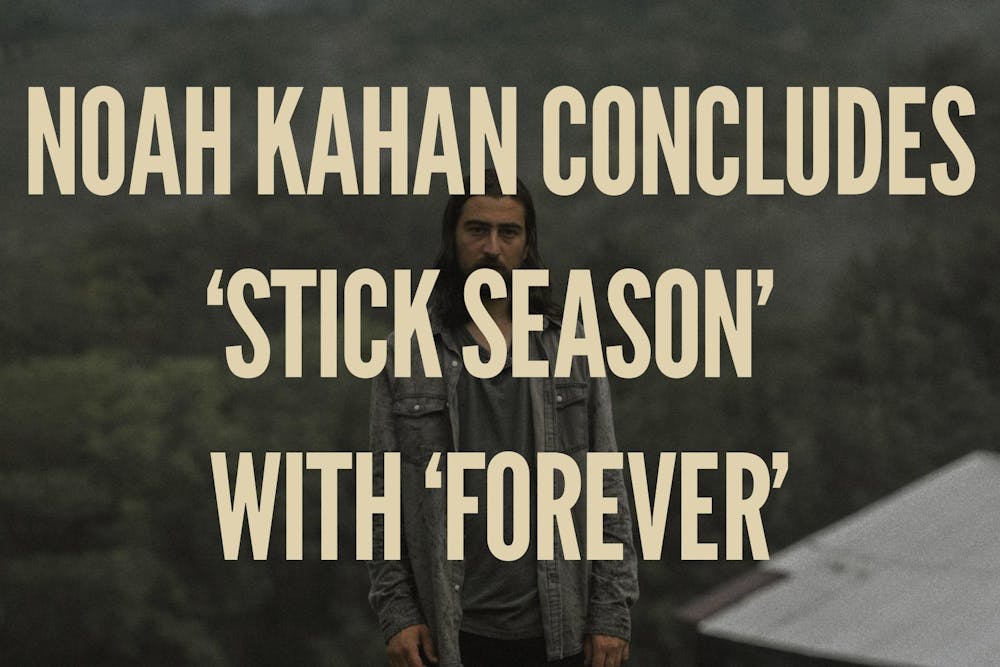On July 8, 2022, Noah Kahan released his single “Stick Season,” which kicked off a journey that would take him from a lesser known indie-pop artist to the chart-topping, Grammy-nominated folk-pop artist he is today. The title refers to what Kahan calls “this really miserable time of year when it’s just kind of gray and cold,” a term that he says is “very specific to where I grew up.” The song, and the album that followed, illustrate this idea of working through hard times, from failed relationships to depression and complicated feelings about hometowns.
Kahan cemented these themes with the first deluxe edition of the album entitled “Stick Season (We’ll All Be Here Forever)” that brought seven new songs into the story. In the wake of this release that brought him and “Stick Season” new attention, Kahan collaborated with several artists to put out new versions of many of the songs on the album. Most recently, Sam Fender joined Kahan on “Homesick,” bringing a new verse and a new perspective to the song while Kahan’s fellow Grammy Best New Artist nominee Gracie Abrams lent her airy vocals to the track “Everywhere, Everything.”
Announced by Kahan as “the final pieces of Stick Season,” the new deluxe, “Stick Season (Forever),” collects the previous collaborations along with two new ones and the brand new song “Forever.” Kahan stated that “Forever” is about perspective and how “a place can remain the exact same physically but becomes totally different as our lives and our experiences change.” “Forever” starts as a slow, emotional reflection on a darker time in his life, hoping to one day mean “anything to anywhere, to anyone,” and uses minimal production and instrumentals that shift halfway through to a more upbeat, lively reflection on better times. The song is about how the word “forever” can feel like either a finality or endless possibilities depending on your perspective.
The first of the two new collaborations sees Brandi Carlile join Kahan on “You’re Gonna Go Far,” a song about letting go of our loved ones and of our hometowns. It is a song to which many of us as college students can easily relate, both leaving home as freshmen to go off to college and preparing to go out into the world as seniors, in many cases leaving our hometowns for good. The song feels like permission, telling you that it is okay to leave when you feel like you cannot while also depicting the pain of letting go of someone you love, knowing that what is best for them is to leave. The addition of Carlile to the track puts new emotion and punch behind the already hard hitting lyrics.
“Paul Revere,” the other new collaboration with Gregory Alan Isakov, also deals with complicated relationships with hometowns. In it, Kahan and Isakov fantasize about leaving, “One day I’m gonna cut it clear / Ride like Paul Revere,” but in the end realize that they cannot. Kahan had performed “Paul Revere” live with Isakov before and fans speculated this collaboration would soon follow, but it was left alone until now, where it became the final piece of “Stick Season.” While “Forever” is the last original song on the album, the way Kahan ordered this release places “Paul Revere” with Isakov as the end of the album’s tracklist.
There is something fitting about the final lyric of “Paul Revere” being “If I could leave, I would’ve already left.” Picking these two songs to be the collaborations that conclude the story of “Stick Season,” along with “Forever,” encapsulates the theme of hometowns and the emotions that surround them. Kahan wrote the album in part as an ode to his small hometown of Strafford, Vermont, but it has become an ode to hometowns worldwide. Many of the same feelings that Kahan has toward Strafford I have for Hanford, California, and people around the world have for small towns everywhere.










